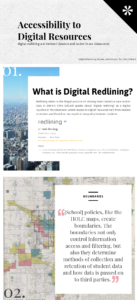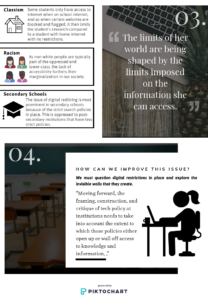Visual Explanation:
For my multimedia assignment I focused on Chris Gilliard’s article “Digital Redlining, Access, and Privacy.” The numbers in each box illustrate the order in which the information should be read. I first start by exploring what ‘redlining’ means, and the history of redlining in Detroit. The next box explains how the Gilliard uses the term ‘digital redlining’ to explain the boundaries that surround researching on the school’s internet. In the background of this is the Detroit redlining map to further the analogy. The third box explains how racism and classism is prevalent in secondary schools. This discrimination takes subtle form in digital redlining and by not acknowledging it is to not acknowledge forms of racism and classism in our educational system. The last box illustrates how educators can combat these issues in their schools.
Reflection:
As someone who has always had unrestricted internet access in my own house, I have never thought about policies blocking web searches as an unfair boundary that some students face. Before reading this article I thought that the only digital boundary that some students face is not having a computer at home, and having to complete their assignments at school. It had never occurred to me that school policies restrict access to some websites and therefore limits the student’s research. If the student’s research is limited and they do not necessarily realize that there is a lot more information out there, then their research will be lacking without the student realizing. Because I never realized that this was an issue, this demonstrates my privilege. Going forward, I will be sensitive in my classroom and be aware that some of my students may experience this. I will also explore what types of web searches my own school flags and see how I can challenge these policies to ensure my student’s research is not limited because they do not have access to internet in their homes. This issue will be especially relevant to me as a teacher because I will be a secondary school teacher, teaching history and social sciences. These two content areas are research heavy and I know my students will be needing to do web searches to complete their projects. Furthermore, some social sciences research may challenge school web search policies, so I will have be mindful moving forward. I will ensure my students know that there may be more information out there than can be seen on the school internet. To think critically about the information available will help to combat digital redlining.
Article: https://www.commonsense.org/education/privacy/blog/digital-redlining-access-privacy
Enjoy!
Caroline Voyer


